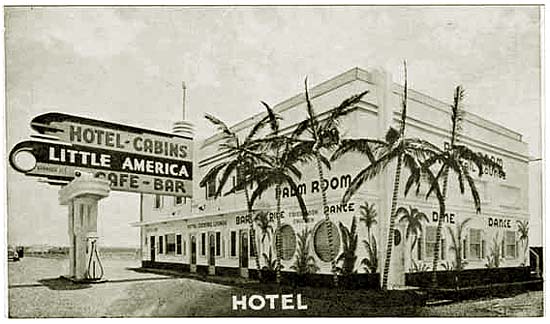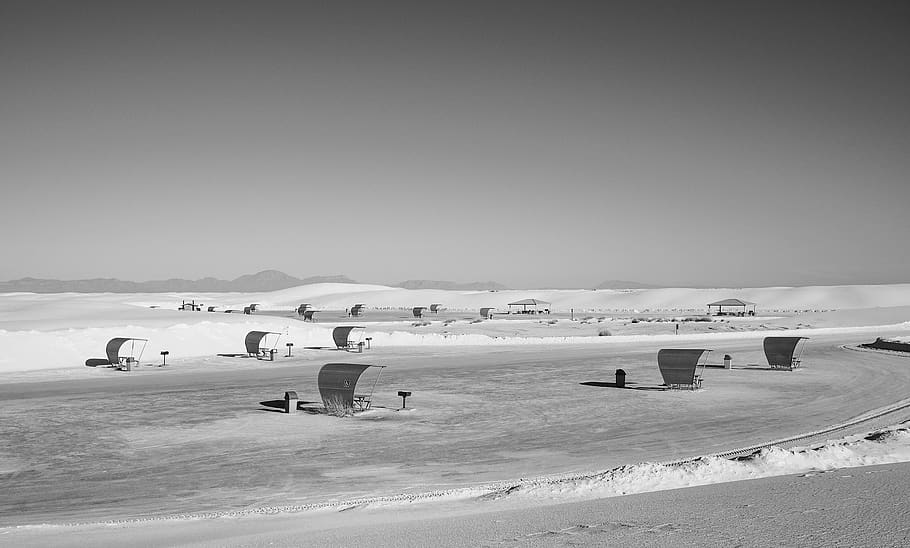CHIARA LEE: LITTLE AMERICA AND OTHER NON-PLACES OASIS
ZUIHITSU
QUIRKY THOUGHTS COLLECTION
Essays, personal stories and curiosities from our guest femxle contributors
CHIARA LEE
LITTLE AMERICA AND OTHER NON-PLACES OASIS

I’ve always been fascinated by non-places, as Marc Augée described them, “spaces of transience where the human beings remain anonymous and that do not hold enough significance to be regarded as places”.
Spaces where we don’t need to conform or appear or relate to anybody, symbols of uncertainty and impermanence, Ballardian haven of weirdness.
In times where I used to tour a lot, I started to be particularly obsessed with rest areas, or whatever people called them: services, autogrill, lay-by, raststaette, basically what wikipedia defines as “public facilities, located next to a large thoroughfare such as a motorway, expressway or highway, at which drivers and passengers can rest, eat, or refuel without exiting onto secondary roads”
I had sort of a rank for different rest areas around the world and I would insist on stopping in some I particularly liked, even when I was almost peeing my pants and my desired area was still many miles away. Non musicians could argue that I could have stopped in a rest area when I needed to pee and also in my desired one, but I soon realized that most touring musicians don’t like to stop too much, especially if males, since, unless they are drunk, don’t feel the need to pee every other hour. On tours the breaks from the long hours in the van are the fewest possible and even stopping for lunch is not usually a real option, since we can all wait to eat at the venue to save some money.
So, since most of the time I was the only one needing to stop, I started to make detailed plans in order to be able to stop at the rest area of my choosing, coveted oasis where finally subject myself to all my rest areas rituals.
When you’re on the road most of your days you start to observe all the travellers’ different routines: truckers take showers, families engage in crazy picnics, some tour managers do a little jogging… It’s a miniature world of things to do and little tasks to fulfill. I personally had a long list of rituals to carry out.
If being an underground touring musician brings its joys and sorrows, being an underground woman musician brings joys… and many sorrows. DIY shows are the best to play but the worst for everything else. As a woman, not having running water, not being able to close the bathroom door, not having a safe place to change outfits or simply not having a mirror to put some makeup on before going up on stage is not cool. So, many of my gas stations rituals were related to water and mirrors: brushing my teeth, putting my makeup on, fixing my hair, washing my armpits etc.
But I also used my time to walk around the short product lanes stuck with all sorts of interesting things. Some were expected: coffee cans almost everywhere, beef jerky in the States, tamarind candies in Mexico, local products in Italy. Some totally unexpected: states fridge magnets and insects candies in US, lanes almost empty but full of chips in Portugal, weird hand made cardigans in the UK, lots of energy drinks in Poland, a glittering ever changing world of things apparently needed by travellers.
Each country’s rest areas seem to share some basic characteristics: you usually have to pay 70 cents to use a toilet in German ones, there’s not much to eat for a vegetarian in the US, and almost only American fast food chains in France, the same paninis in every Italian autogrill. But to a keen eye these neutral spaces are not that neutral and some of them are not only non-places, they are planets on their own.



Take Little America in Wyoming, this gas station/motel/restaurant stop was built in 1952. The creation myth of the place, as described by its founder, Robert Holding, is that he, as a young rancher herding sheep in the area, got stuck overnight in a blizzard, 40 degrees below zero. He survived the night, and later imagined building a refuge there, in the remote treeless plains of southeastern Wyoming, for any travelers passing through. Since he owned the land, he did, and named it after Admiral Byrd’s remote snowbound Antarctic base, Little America.
Unlike an oasis in the middle of nowhere, Little America is highly anticipated by a barrage of billboards along Interstate 80 depicting perfect ice creams for only 50 cents, children swimming in a luxury pool, soft beds with inviting sheets and slogans like “a little luxury, a little change of pace” and similar slogans.
The anticipation is even more intense due to the desertic landscape all around. The non-place is suddenly fantasized and becomes familiar, proving the main non-places paradox theory: anyone can feel ‘at home’ in them regardless of their actual background because they are equally alienating to everyone.
I personally still struggle on the concept of feeling at home, I feel at home anywhere and nowhere, mostly depending on my mood. As much as I wanted to feel at home in Little America it didn’t happen for me, even if I still pretty much enjoyed eating the 50 cents cone and take a look at the work uniforms with a vintage touch.
Now that I think about it, perhaps it was the “family” touch that was missing. But not at Tebay Services in the UK, which is described on their website as “the first family run motorway services on the UK roads “. “Proper food with locality and a sense of belonging is at the very heart of everything we do” they go on, and in fact this is probably the most welcoming rest area I’ve ever been, there are no franchises or fast food, the place greets you with a smell of real food and bow windows with a nice view on the British countryside, a pretty lake, nice design furniture, lights that invite you to sit just for a little more time and to make you almost feel this place is not only a passageway but a destination. It was almost confusing to have the whole travelling party (at that time we had a European co-headlining tour and we were travelling with other bands) to consciously decide to spend some time there, having a nice warm lunch for a change, wandering a little by the lake and checking our emails sitting on a nice chair with the view.
If my tour routines were perfectly executed in comfortable places like that, my curiosity continued to push me in different directions though and I was always ready to stop in unlikely places. Like the smaller rest areas in the south of Italy: a throwback to the 80s in places with old style names lighted by neon lights where you can find toys and dolls you never even heard of (probably there since the 80s), extremely short coffees, gigantic unfancy paninis, vintage plastic furniture and tvs perpetually tuned into soccer programs. Or to the little ones in deserted places in central and north America, tiny human fortresses surrounded by amazing natural landscapes.

In retrospective, I think what was fascinating for me was that most of these spaces, supposedly “not holding enough significance to be regarded as places” all had a peculiar identity.
The tours we undergo as musicians are not like the tourists ones, most of the times we don’t have the time to go to the centre of Paris and see the tour Eiffel, or take a subway to Manhattan if we are playing in Brooklyn, or even just walk around the centre of some historic small town but this doesn’t mean we’re not seeing the world. As Annie Dillard well put it “The point of going somewhere is not to see the most spectacular anything. It is simply to see what is there. We are here on the planet only once, and might as well get a feel for the place”, even just for a simple rest area.

Chiara Lee had been one of the main members of the band Father Murphy for 15 years. The band released a series of different concept albums and EPs based around the idea of expressing the sound of the Catholic sense of guilt, until they decided to end the project in 2018 with a final album in the form of a Requiem for the band itself.
Father Murphy played extensively across Europe, UK, North America, Australia and Russia. As their narrative progressed, they expanded from psych rock tunes to far more sombre rituals, increasingly leftfield experimentation and to almost theatrical performances.
She’s now composing music for films, art installations and reading in duo with freddie Murphy.
